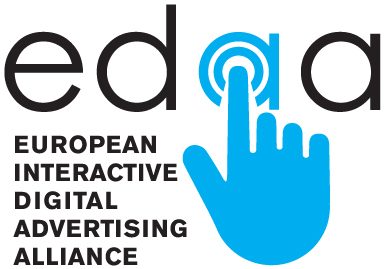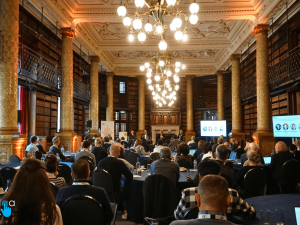
Since 2012, the core mission of EDAA has included delivering consumer-facing transparency, choice, control and education, regarding online advertising, bringing together various actors to set industry-wide best practice standards that deliver both consumer-facing and business-oriented solutions.
When it comes to information to be provided to consumers, a central question that we ask ourselves is “how can information be displayed in a simple, intuitive yet comprehensive way to consumers?”. There is a great deal of complexity when it comes to online advertising, and the question itself may seem contradictory. Our solution to this is through the AdChoices Icon – a small blue symbol attached to all online ads – this displays a simple text (“AdChoices” when hovered) and is interactive – when clicked, consumers can find more information in simple terms about why the specific ad has been delivered to them. We are already building further disclosures onto this transparency tool, which is well-recognised by consumers, to align with the heightened information requirements of the DSA, whilst retaining simplicity and convenience from the consumer standpoint. The tool also enables companies to provide one-click links to more detailed information (a layered approach) for consumers who wish to delve a little deeper. Our research demonstrates that the Icon is well-recognised and understood – in 2021, Ipsos MORI conducted research providing many data points, including that in the majority of surveyed markets, one in two consumers actively interact with the Icon when displayed. The research saw up to 57% uplift in consumer trust towards brands and up to 47% towards interest-based advertising where an ad was carrying the Icon. Meaningful transparency through user-friendly and intuitive interfaces that do not disturb the user’s online experience, is clearly the way forward.
From more recent research by people-participation agency Clever Together – “Your Online Voices” consumer conversations (the largest effort of its kind in the online advertising space) – consumers elaborated on what level of information they wish to know as to how they are served with ads. Many opinions were gleaned about information overload, and setting the right levels. At EDAA, we’re pleased to see that the DSA heightened transparency information on platforms goes a long way to delivering to the level of expectations expressed by consumers (who reported wanting to know what data is collected, how, by whom, and how it used to serve them ads).
The point of this blog post isn’t to dive into the benefits of data-driven, interest-based advertising, of which there are a great number of opinions, facts, and figures already expressed. Yet we rather want to consider a different angle – one that is being asked, often by those outside of the industry itself, including policy makers… What are the alternatives and is there a demand for something to replace the current model? At EDAA, we believe there are different issues to address when tackling this question:
- First off, consumers aren’t asking for alternative methods of ad delivery, they are asking for better options to ensure practical and meaningful control
- Tellingly, over 50% of consumers (in the YourOnlineVoices research) wouldn’t use choices they are provided with, but want to be provided with those choices all the same (the provision of information and choice is important for the trust, even where people wish to receive relevant ads above less relevant ads)
- About half of consumers in the same research signalled desire for actually improving the relevance of ads, rather than diluting it – expectations are shifting on one side of the spectrum for an ever-increased level of personalisation, including through advertising options that are presented to people. Given a high level of understanding that data processing is involved in online advertising (a finding from MTM Research Agency in their study on “How EU Citizens Perceive Digital Advertising Since GDPR”, conducted for EDAA, showed that 97% of respondents were aware that data is used for online advertising), the YourOnlineVoices study later demonstrated a notably common feeling that ads could be better tailored
- Consumers want to be able to practically, meaningfully, and easily curate their own advertising experience when online. They reported that self-curation and self-identification of interests would be much more effective and would ultimately lead to a better response to the ads they see
- Consumers want retention of choices across the web without re-doing the same choices over and over
- Alongside having their preferences retained, consumers expressed that they would like the ability to easily revoke consent they’ve given and delete associated data
Privacy is a fundamental right, of course, but it is also much more than that. The way in which it has been regulated and subsequently enforced has led to the growth of tools – such as cookie banners – that today govern the relationship of how we navigate online and determine a large part of our online experience. The idea of “cookie fatigue” (increasingly referenced) – or rather, notice fatigue (less commonly referenced, but more accurate, in our view, to reflect the perceived concern) – is an unintended consequence, and we fully agree with efforts aimed at encouraging solutions that simplify consumer disclosures and are respectful of consumers’ online preferences. EDAA’s mission is to do just that. And with good cause – we believe that by empowering consumers, the benefits of increased consumer trust can be reaped by all involved, from advertisers, publishers and across the intermediary advertising ecosystem. With trust comes an increased comfort and receptiveness towards the marketing communications that are being delivered, leading to a greater willingness for engagement and dialogue on the part of consumers. There is scope for a win-win-win here, towards more empowered consumers, a more trusted and trustworthy industry offering for advertising transparency, and a more enhanced toolkit that regulators can call upon beyond legislative instruments. EDAA can help deliver on that future.
The value of industry best practice and accompanying standards comes with uptake in the market and EDAA should be proud of the market footprint it’s demonstrated over the years.
We see the opportunity to support collective aims and ambitions in this area, and this is what EDAA can offer:
- We bring together both website operators and technical solutions providers.
- Our mission is to empower consumers with transparency, choice and control over their online advertising preferences
- Companies must be held to account to respect consumers’ wishes, and provide a layered accountability structure – comprising both certification through independent auditors, and enforcement – including consumer redress in their own market and language – through independent advertising standards authorities.
We believe in the need to help foster solutions that respect and align with the benefits of media plurality and the right for businesses to pursue legitimate monetisation of the value they create.
We believe in the value of data-driven, and particularly interest-based, advertising – when done respectfully and in view of shifting consumer demands and expectations – as a means to improve the consumer experience whilst providing a legitimate opportunity for that monetisation.
Lastly, we believe in the need to support business by enshrining in industry principles and best practice what respectful and responsible advertising entails, in a harmonised way that further consolidates a level European playing field.
On 28 April, EDAA was invited to join the multi-stakeholder discussion organised by the European Commission, on the possibility of a voluntary solution that could address the concerns of consumers in relation to data-driven advertising. We look forward to the opportunity to contribute to the discussions in this area, bringing our cross-industry and consumer-facing perspective, that will add to a balanced and sustainable solution.






